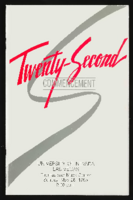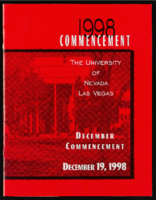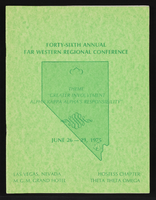Search the Special Collections and Archives Portal
Search Results

Transcript of interview with Gertrude Rudiak by Claytee White, January 11, 2007
Date
Archival Collection
Description
Gertrude (n?e Rightman) Rudiak was born in 1915 in North Dakota to Russian immigrants. She grew up in Wisconsin until 1924. That was the year the family drove to California via the Yellowstone Trail, a dusty, undeveloped road marked by yellow stones. In Los Angeles, her father practiced chiropractic, a holistic approach to well-being for which there was little knowledge at the time. Gertrude earned her music degree at University of California at Berkeley; a decision that did not lead to a career. She then attended a business college and got a job as a social worker in Northern California. In 1941, she met and soon married George Rudiak. It was the advent of World War II. George enlisted in the service and was assigned to Las Vegas Gunnery School (Nellis Air Force Base.) Since he had a law degree from University of California at Berkeley and passed the Nevada Bar exam, he found supplemental employment with local attorneys. Las Vegas became the Rudiaks? permanent home where they raised their five children. In this interview Gertrude recalls the stories of coming to live in Las Vegas of the 1940?s: their phone number was 1-2-3; the neighborhood they lived in longest being Scotch 80s and being part of the secular and Jewish communities.
Text

Transcript of interview with Judge Abbi Silver by Barbara Tabach, January 10, 2017
Date
Archival Collection
Description
It is evident that a keen wit and persistent tenaciousness to protect victims of crime have earned Judge Abbi Silver the reputation that elevated her to her current position as Chief Judge of the Nevada Court of Appeals. She is the first female to hold this position. Judge Silver is a lifelong resident of southern Nevada. She was raised in Boulder City, where her family was the only Jewish family at the time. Her father was a doctor and eventually the family moved into Las Vegas, where she graduated from Clark High School and then University of Nevada, Las Vegas (1986). Always an overachiever, she worked multiple jobs?waitress, Utah Jazz cheerleader, dancer?while earning her undergraduate degree and then her law degree from Southwestern University of Law, in Los Angles (1989). In this oral history, Judge Silver recalls being a law clerk for Honorable Earle White, Jr., joining the Clark County District Attorney?s Office and being assigned as the Chief Deputy DA for the Special Victims
Text

Stavan Corbett oral history interview: transcript
Date
Archival Collection
Description
Oral history interview with Stavan Corbett conducted by Nathalie Martinez on November 5, 2018 for the Latinx Voices of Southern Nevada Oral History Project. Barbara Tabach and Rodrigo Vazquez also participate in the questioning. Stavan Corbett is a member of the Latino community who has served as an educator and politician in Las Vegas. Growing up in Las Vegas, Stavan was exposed to various environments that all helped him shape his Latino identity. Stavan was able to appreciate the Catholic and Jewish cultures as well. During the 1970s and '80s his experiences with first and second generation Latinos played a large role in his identity formation, especially as a student. He was the first in his family to graduate from high school and college. Stavan worked in the hotel industry and moved on to work with troubled youth and eventually become a member of the Nevada State Board and the Clark County School Board. His continued work with the Latin Chamber of Commerce has also allowed him to be involved with the Latino Youth Leadership Conference. Subjects discussed include: Identity Struggle, Interracial Relationships, Working in the Hotel Industry, Clark County School District, and Cultural Assimilation.
Text

Dr. Javier A. Rodríguez oral history interview: transcript
Date
Archival Collection
Description
Oral history interview with Dr. Javier A. Rodríguez conducted by Elsa Lopez and Barbara Tabach on December 19, 2019 for the Latinx Voices of Southern Nevada Oral History Project. Dr. Javier Rodríguez, Biology Professor at the University of Nevada Las Vegas, talks of his personal and educational history that led him to UNLV. He discusses his migration from Puerto Rico to California where he received his PhD from the University of California Berkley and became a biological museum curator for various animal specimens. He later moved to Las Vegas to teach at UNLV where he has now been for nearly two decades; Dr. Rodríguez shares how UNLV has changed since he first started working here, including the university's increased interest in faculty research to become a Top Tier institution. Subjects discussed include: Puerto Rico; University of California Berkley; University funding; Tier 1 research institutions.
Text

Transcript of interview with Alan Clancy by Su Kim Chung, by February 12, 2015
Date
Archival Collection
Description
Alan Clancy grew up in Sydney, Australia, the second son of famous ballroom-dancing parents. He recalls that he had incredible energy as a child, and, therefore, his parents enrolled him in the Shirley de Paul Studio to learn gymnastics, tap, ballet, and jazz. He also became a soprano singer. This training did well for him for as he went through high school he won trophies in sports and participated in musical productions. Eventually, because of a neighboring friend, Kay Dickerson, Alan moved to the Rudas Acrobatic Studio where he received further training and eventually contracted with Tibor Rudas to participate in an entertainment group called “The Las Vegas Dancers”. He was only seventeen when the group boarded a ship for Hong Kong in an enterprise which would eventually allow the dancers to entertain around the world for approximately two and a half years. When the group returned, Alan auditioned for the Tommy Leonetti television show and then for Les Girls in Sydney. Eventually Tibor Rudas appeared with a contract for Alan, when he had just turned twenty-one, to fly to Las Vegas to work in the Folies Bergere at the Tropicana Hotel and Casino. When he arrived in Las Vegas, he was surprised at the size of the city and the hotels but was overly impressed by the neon signs, the showrooms with their nude dancers, the costuming, magnificent sets, the choreography, and the dress of the patrons. He remembers his first night performing in the Folies and the amount of stars in the audience, for example, Elvis Presley, Liberace, and Zsa Zsa Gabor. Alan goes on to describe the many people that he met in Las Vegas, working in various shows, and the many friendships made over the years. However, he eventually became interested in opening his own vintage clothing store, Vintage Madness, near the Strip. He talks about his many customers, the stores around him, his creative ways of acquiring items to sell and the success that was made. Unfortunately, during the middle of one night the store burned to the ground which left Alan devastated. Eventually, however, he purchased three buildings on Fourth Street and opened an art gallery, a coffee shop, and a small stage. His mercantile interest allowed him to leave show business and briefly open a store in Laguna Beach, Southern California. It wasn’t long until Barclay Shaw asked him to work in “Splash” at the Riviera Hotel in Vegas and, therefore, he returned to show business. However, Shaw, his friend, died and so did his mother and he lost interest in his stores, renting them out. Consequently, he returned to live in California and began working with Aids patients. Alan returned to Las Vegas for the reunion of the cast of Folies Bergere and noticed the many changes made in Las Vegas from when he first arrived to perform at the Tropicana Hotel.
Text

University of Nevada, Las Vegas (UNLV) 22nd commencement program
Date
Archival Collection
Description
Commencement program from University of Nevada, Las Vegas Commencement Programs and Graduation Lists (UA-00115).
Text

University of Nevada, Las Vegas (UNLV) 35th commencement program
Date
Archival Collection
Description
Commencement program from University of Nevada, Las Vegas Commencement Programs and Graduation Lists (UA-00115).
Text

Alpha Kappa Alpha Sorority 46th Far West Regional conference program (M.G.M. Grand)
Date
Archival Collection
Description
From the Alpha Kappa Alpha Sorority, Incorporated, Theta Theta Omega Chapter Records (MS-01014) -- Ivy Leaf magazines and event souvenir programs file.
Text

Cindy Baca oral history interview: transcript
Date
Archival Collection
Description
Oral history interview with Cindy Baca conducted by Barbara Tabach on May 22, 2019 for the Remembering 1 October Oral History Project. Cindy Baca, born and raised in Las Vegas, talks about her family and occupation as a librarian at Escobedo Middle School. Cindy's twin daughters were present and injured during the Route 91 Festival and October 1 shooting. She describes their experiences and the Random Acts of Kindness project she piloted at her school after the incident.
Text

Transcript of interview with Ronald Simone by Claytee White, May 5, 2009
Date
Archival Collection
Description
Musician Ronald Simone of Las Vegas credits his father’s guidance and his upbringing in New Haven, Connecticut, for shaping his musical and educational aspirations. Due to its proximity to New York City and the influence of Yale University, New Haven offered its residents the finest in musical entertainment; as a result, many musical greats were from or had lived in New Haven and most Broadway shows opened at New Haven’s Shubert Theater. Born in 1935 with the gift of perfect pitch, Simone began to play the piano at a young age and could play most pieces by ear. He began playing professionally at age eight in 1943 with a weekly stint on a radio show, Kitty's Revue. Still in grade school during World War II he began touring locally with an amateur producer, who formed a show that played military bases and hospitals around Connecticut and into New York and Massachusetts. In high school Simone formed his own trio and a quartet and played piano in gin mills, illegal card rooms, and resorts in upstate New York while playing trumpet in the high school band. He joined the Musicians Union at 18 and continued to play in New York and Connecticut clubs and theaters throughout his five years at Yale. During his second year at Yale the School of Music became a graduate school, from which Ron graduated in 1958. Ron’s sister Louise married one of his Yale classmates, a drummer, and the couple moved to Las Vegas. Ron visited his sister in 1959, loved the musical opportunities he saw, transferred his Musicians Union membership, and moved to Las Vegas with his friend, violinist Joe Mack, in September 1960. After sub work and playing a lounge show at the Riviera, he spent five and a half years in the Riviera showroom, moving in 1966 to the Desert Inn, where he played piano in the exclusive Monte Carlo Room for five years for the likes of Dean Martin, Sandy Koufax, Sammy Davis Jr., and Kirk Kerkorian. From there Simone went to the Dunes, where he remained for the next nineteen years working with choreographer Ronnie Lewis and rehearsing and playing all the Casino de Paris shows, line numbers, and production numbers. In July 1989, Musicians Local 369 went on strike. Because Simone was playing the Follies Bergere at the Tropicana—the first house band to strike—he was among the first musicians to walk out. Musicians at all but three Strip hotels (Circus Circus, Riviera, and the Stardust) followed. While the musicians strike lasted nearly eight months, Simone was recruited for sanctioned sub work for the duration at the Lido de Paris show at the Stardust. After the strike ended he worked with Johnny Haig's relief band playing six nights a week at various hotels.
Text
